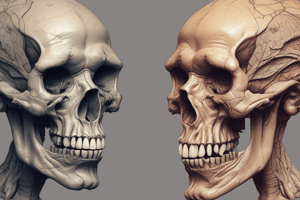Podcast
Questions and Answers
Match the following branches of anthropology with their primary focus:
Match the following branches of anthropology with their primary focus:
Physical or Biological Anthropology = Biological and genetic aspects of human beings Archaeology = Understanding past civilizations and cultures through artifacts Cultural Anthropology = Examination of contemporary cultures around the world Linguistic Anthropology = Study of human language and its evolution
Match the following terms with their definitions:
Match the following terms with their definitions:
Strata = Layers of soil in which artifacts are found Holistic approach = Comprehensive method used to understand humanity Genetic aspects = Study of inheritance and variation in human biology Daily lives reconstruction = Process of understanding how ancient people lived
Match the following statements with the correct branch of anthropology:
Match the following statements with the correct branch of anthropology:
Study of fossils, skulls, bones = Physical or Biological Anthropology Reconstruction of ancient social organizations = Archaeology Analysis of contemporary cultures = Cultural Anthropology Understanding human evolution = Physical or Biological Anthropology
Match the following branches with their methods of study:
Match the following branches with their methods of study:
Match the following terms with their respective meanings:
Match the following terms with their respective meanings:
What is the primary focus of archaeology as a subfield of anthropology?
What is the primary focus of archaeology as a subfield of anthropology?
What significant developments marked the rise of early agricultural societies?
What significant developments marked the rise of early agricultural societies?
Match the following descriptions with the correct anthropology branch:
Match the following descriptions with the correct anthropology branch:
What is the primary concern of sociocultural anthropology?
What is the primary concern of sociocultural anthropology?
What research techniques are commonly employed by sociocultural anthropologists?
What research techniques are commonly employed by sociocultural anthropologists?
What is the principle of cultural relativity in anthropology?
What is the principle of cultural relativity in anthropology?
How does anthropology offer a comprehensive understanding of humanity?
How does anthropology offer a comprehensive understanding of humanity?
What is the primary goal of anthropology as a field of study?
What is the primary goal of anthropology as a field of study?
How does anthropology combine scientific rigor with cultural sensitivity?
How does anthropology combine scientific rigor with cultural sensitivity?
What is the primary focus of biological anthropology?
What is the primary focus of biological anthropology?
How does biological anthropology challenge preconceived notions of race?
How does biological anthropology challenge preconceived notions of race?
What is the perspective of anthropology regarding evolution?
What is the perspective of anthropology regarding evolution?
According to anthropology, what factors shape human diversity?
According to anthropology, what factors shape human diversity?
Study Notes
Introduction to Anthropology
Overview of Anthropology
Anthropology is a multifaceted discipline that seeks to understand human life in its diverse forms. It encompasses the study of human biology and evolution, history, culture, and language. As a holistic approach to understanding humanity, anthropology delves into various aspects of human existence, offering unique insights into human societies and cultures across time and space.
Subfields of Anthropology
There are three main branches within the field of anthropology:
-
Physical or Biological Anthropology: This branch focuses on the biological and genetic aspects of human beings. Historically, it has contributed to understanding human evolution and modern human variation. By studying fossils, skulls, bones, teeth, and living individuals, biologists can piece together a picture of how humans evolved over millions of years.
-
Archaeology: Archaeology concerns itself with understanding past civilizations and cultures through the study of artifacts, structures, and environmental remains found buried in layers of soil called strata. By analyzing these remnants, archaeologists can reconstruct the daily lives, economies, social organizations, and belief systems of ancient peoples.
-
Cultural Anthropology: Also known as social anthropology, this branch examines contemporary cultures around the world. It involves observing and recording behaviors, customs, institutions, kinship relationships, religions, and languages of human groups. Cultural anthropologists seek to uncover universal principles underlying human behavior and to interpret them in a global context.
Importance of Anthropology Today
In today's rapidly changing world, anthropology plays a crucial role in addressing pressing issues such as climate change, racial justice, and health equity. By studying the complex interplay among biology, culture, and environment, anthropologists contribute to finding solutions to global problems and fostering a better understanding of human diversity.
Studying That Suits You
Use AI to generate personalized quizzes and flashcards to suit your learning preferences.
Description
Explore the foundational aspects of anthropology, including its subfields of Physical/Biological Anthropology, Archaeology, and Cultural Anthropology. Learn about the importance of anthropology in addressing contemporary global challenges and understanding human diversity.



